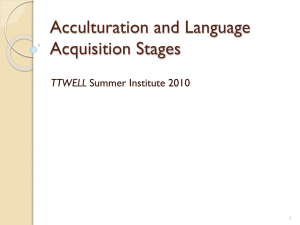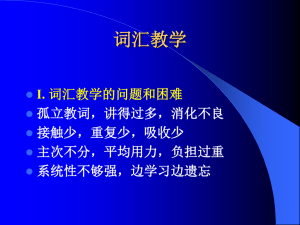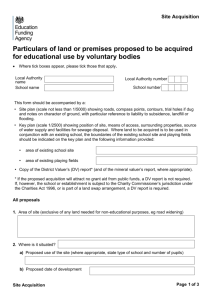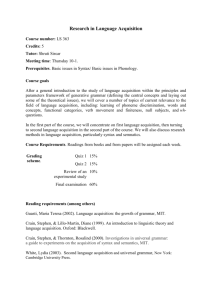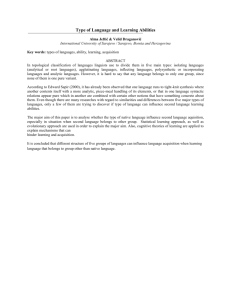RNW2134A-150707
advertisement
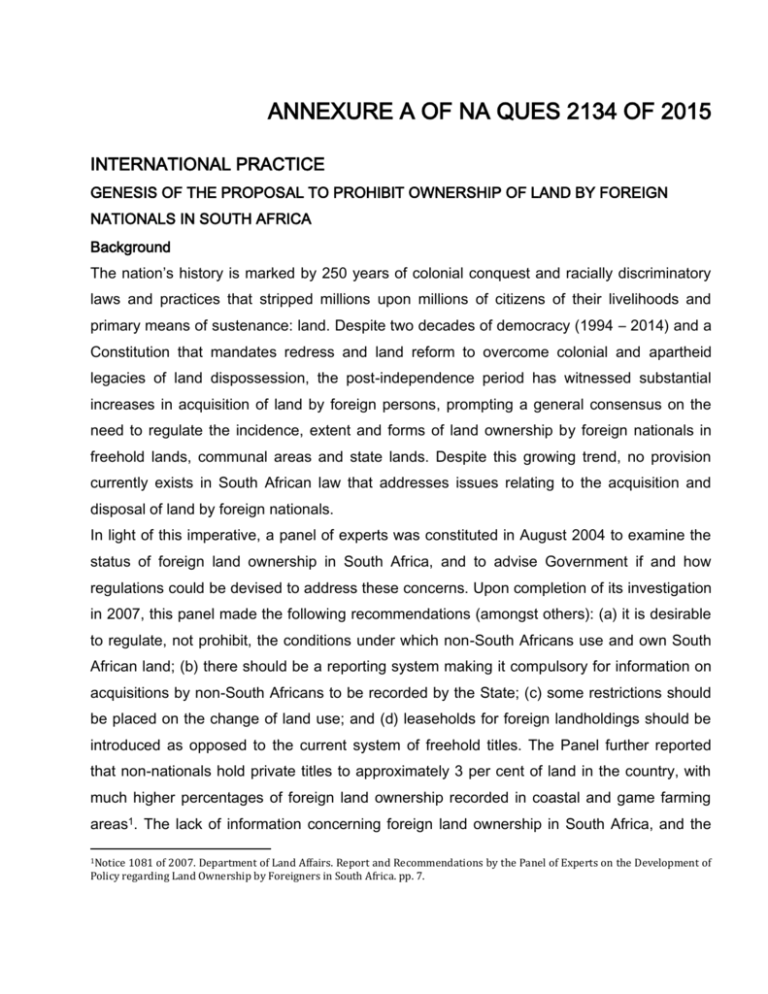
ANNEXURE A OF NA QUES 2134 OF 2015 INTERNATIONAL PRACTICE GENESIS OF THE PROPOSAL TO PROHIBIT OWNERSHIP OF LAND BY FOREIGN NATIONALS IN SOUTH AFRICA Background The nation’s history is marked by 250 years of colonial conquest and racially discriminatory laws and practices that stripped millions upon millions of citizens of their livelihoods and primary means of sustenance: land. Despite two decades of democracy (1994 – 2014) and a Constitution that mandates redress and land reform to overcome colonial and apartheid legacies of land dispossession, the post-independence period has witnessed substantial increases in acquisition of land by foreign persons, prompting a general consensus on the need to regulate the incidence, extent and forms of land ownership by foreign nationals in freehold lands, communal areas and state lands. Despite this growing trend, no provision currently exists in South African law that addresses issues relating to the acquisition and disposal of land by foreign nationals. In light of this imperative, a panel of experts was constituted in August 2004 to examine the status of foreign land ownership in South Africa, and to advise Government if and how regulations could be devised to address these concerns. Upon completion of its investigation in 2007, this panel made the following recommendations (amongst others): (a) it is desirable to regulate, not prohibit, the conditions under which non-South Africans use and own South African land; (b) there should be a reporting system making it compulsory for information on acquisitions by non-South Africans to be recorded by the State; (c) some restrictions should be placed on the change of land use; and (d) leaseholds for foreign landholdings should be introduced as opposed to the current system of freehold titles. The Panel further reported that non-nationals hold private titles to approximately 3 per cent of land in the country, with much higher percentages of foreign land ownership recorded in coastal and game farming areas1. The lack of information concerning foreign land ownership in South Africa, and the 1Notice 1081 of 2007. Department of Land Affairs. Report and Recommendations by the Panel of Experts on the Development of Policy regarding Land Ownership by Foreigners in South Africa. pp. 7. absence of any regulatory framework that places land acquisition restrictions on nonnationals, is highly problematic as it hinders achieving equitable land distribution patterns and thus contributes to land pressure and landlessness in the country. On 12 February, 2015, President Zuma in his State of the Nation Address announced Government’s intention to institute a ceiling on land ownership (to be set at a maximum of 12 000 hectares), prohibiting foreign nationals from owning land but allowing them to enter into long-term lease agreements. One of the most important reasons for regulating foreign land access and ownership in South Africa is to realise constitutional declarations and overall national aims of poverty reduction and inclusive economic growth. Section 25 (5) of the Constitution declares that: The state must take reasonable legislative and other measures, within its available resources, to foster conditions which enable citizens to gain access to land on an equitable basis. This is further echoed in the Green Paper on Land Reform (2011), which puts forward “democratic and equitable land allocation…” as one of the key pillars that should inform the land reform programme. This necessitates that the pace of unregulated land concentration is curbed. One method to achieve this is to regulate uncontrolled acquisition and ownership of land by non-South Africans. Furthermore, the National Development Plan has the goal of attaining household food security for all citizens. An estimated 23 million South Africans still live below the poverty line, and the number of people living in extreme poverty (defined as those unable to access sufficient food to meet their daily nutritional needs) increased between 1997 and 20082. In 2011, an estimated 10.2 million South Africans continued to live below the food poverty line (FPL)3, constituting a food insecurity crisis. Thus, the regulation of land acquisition and ownership by non-nationals is a necessary step in fighting poverty, inequality, joblessness, landlessness and food insecurity. In advancing these national objectives, as well as ensuring a more stable political environment, regulation of foreign land ownership fundamentally serves South Africa’s national/ public interest. This approach is 2Statistics South Africa (StatsSA). 2014. Poverty Trends in South Africa: An examination of absolute poverty between 2006 and 2011. Pretoria: StatsSA. 3Ibid. comparable with most advanced democracies in the World, and indeed developing economies in the South. International Practice The regulation of foreign land acquisition and ownership has been undertaken in many countries throughout the world, both in numerous OECD countries (Australia, Canada, Greece, Hungary, New Zealand, Switzerland etc) and elsewhere in Africa and Asia (Fiji, Malawi, Zambia, Singapore, Indonesia, Thailand etc). Such regulatory instruments are often instituted for the advancement of national/ public interest. Depending on the country, foreign acquisition of property is deemed to serve the national/ public interest only if it promotes (rather than infringes upon) various factors including national security, employment, technological advancement, domestic economic interests, sound utilization of natural resources, development initiatives, protecting areas of national strategic importance, national political stability, national unity, and improved living standards for nationals. For example, in determining eligibility for foreign investments, New Zealand’s Overseas Investment Office considers how acquisition of certain real estate will contribute to economic growth and development in the country. Factors considered include whether investments will promote increased employment, technological improvements, skills development or enhanced manufacturing capacities4. This is guided by theOverseas Investment Act of 2005, which regulates the investment in certain New Zealand assets by “overseas persons”. Consent from the New Zealand Government is required for an overseas person to acquire an interest in real estate (which includes both freehold and leasehold interests) if such real estate is rural (or non-urban) land greater than 5 hectares; or includes or adjoins land that is considered to be "sensitive" (i.e. adjoining foreshore or seabed land, certain islands, land that is subject to a heritage order, registered historic places or areas, land held for conservation purposes, land in public spaces etc.). After receiving much criticism for poor implementation of the 2005 Act and having no efficient method of measuring the amount of land under the control of foreign nationals, New See Government of New Zealand, Overseas Investment Act, Public Act 2005, No 82. http://www.linz.govt.nz/sites/default/files/docs/overseas-investment/overseas-investment-act-2005.pdf. 4 Zealand’s government has recently introduced the Land Transfer (Foreign Ownership of Land Register) Amendment Bill of 2013, which proposes the establishment and maintenance of a comprehensive register of all foreign owned New Zealand land. The register shall contain names and nationalities, the amount and value of land, and the regions in which the land is situated. Its primary purpose is to serve as a resource for policy-makers and the general public, who will be able to gauge the extent of foreign landholdings across New Zealand5. In December 2014, Fiji amended its 1974 Land Sales Act to prohibit the sale of any land within town boundaries to foreigners. Also, the amendments mandate non-Fiji citizens who currently own land in Fiji, without a house located on the property, to build such accommodation within two years, and spend a total of $US126 000 on construction costs, or incur penalties for failure to do so6. Similarly, from July 2015, the Australian Tax Office will start to collect information concerning foreign purchases of agricultural land. This is the first step in the government’s process of creating a national land register. Australia’s Foreign Acquisitions and Takeovers Act of 1975 has long prohibited foreign acquisition of property or foreign investment if it is contrary to national interest7, yet no such register exists. Additionally, the Australian Government has stated that it will tighten restrictions on foreign purchases of agricultural land by reducing its screening threshold from $252 million to $15 million from 1 March 20158. Furthermore, proposals to restrict foreign land ownership, while offering long-term leasehold arrangements for non-nationals, correspond closely to other countries’ policies. For instance, from January 2002, non-citizens and foreign companies in Malawi are prohibited from acquiring freehold title to land.9 However, such individuals and entities are permitted to lease Government of New Zealand, Rt Hon Winston Peters, 2013. The Land Transfer (Foreign Ownership of Land Register) Amendment Bill 2013, Member’s Bill. Draft for Consultation. 5 6 http://www.pngloop.com/2014/12/12/fiji-govt-amends-land-sales-act/#sthash.JrvnG7WJ.dpuf 7 See Government of Australia, Foreign Acquisitions and Takeovers Act, No. 92 of 1975. 8 Sanyal, K. 2014. “Foreign investment in Australian agriculture.” Parliamentary Library, Research Paper Series, 2013-2014. 9 See Government Of The Republic Of Malawi, Ministry of Lands and Housing, 2002. Malawi National Land Policy; Government of Australia, 2015. Government tightens rules on foreign purchases of agricultural land.” Available at: February 2015. www.pm.gov.au/media/2015-02-11. Accessed on 16 land from the Government, or directly from private landowners for investment purposes in accordance with their residential and investment objectives. The standard leasehold term for such leases runs for 50 years or less and is renewable. Considering the increasing trend of land acquisition by foreign juristic persons, especially within the African context, many countries have instituted mechanisms to protect their valuable assets from foreign encroachment10. Hence, many of the restrictions described above, regarding provisions in various countries regulating the extent and nature of foreign land ownership, are often applicable to certain categories of land targeted for the fulfilment of national objectives including: vacant residential land and landed property (e.g. Singapore); “Sensitive assets” (i.e. islands, coasts, lakes, public spaces, heritage or historical lands etc.) (e.g. New Zealand); residential real estate, vacant land and rural land (e.g. Australia and Brazil); and land within border areas (e.g. Greece and Brazil). Therefore, the Regulation of Land Holdings Bill’s proposals in many ways corroborate how other countries in the developed and developing world have regulated foreign land ownership to serve their national/ public interest. This also applies to the Bill’s proposals for conditions placed on foreign nationals concerning land use and administration of regulations imposed on foreign land acquisition and ownership. Concerning the latter, several countries have administrative bodies similar to the proposed Land Commission (in South Africa) that administer foreign land ownership regulations. These include Agricultural Lands Board in Zambia, and the Land Dealings Unit located within the Singapore Land Authority. FURTHER ANALYSIS JUSTIFYING FOREIGN LAND OWNERSHIP RESTRICTIONS A useful starting point in an international comparative enquiry into the subject of land use or acquisition by non-citizens is the consideration of its real impact on the society. Two possible extremes are envisioned. First, those who dismiss the hue and cry over this trend as simply too emotive, perhaps irrational, and in turn welcomes foreign ownership on account of its positive force on the broader economy. This view posits that any attempt to regulate or 10Bond, P. 2006. Looting Africa: The Economics of Exploitation. London: Zed Books. restrict such trends is tantamount to deterring necessary and badly needed foreign direct investments. From the other perspective, land ownership is not merely an economic or investment issue devoid of social content. As such, any economic benefit from such transactions comes with higher social and political costs. These costs include: loss of sense of belonging, especially where economic superiority turns original inhabitants into playing subservient roles in their ancestral home.11 For instance, in respect of restrictions on foreign ownership of United States’ farmlands, it was reported that the historical reasons were mainly fourfold: (a) fear for the loss of local control and concern for the survival of farming communities; (b) the possibility of a feudaltype system of absentee landholdings arising from such ownership; (c) investment from abroad causing land prices to rise beyond the potential of local farm operators and thereby threatening the traditional family-type farming; and (d) the possibility of foreign ownership causing higher rents, reducing soil fertility and food supplies, and impeding the effectiveness of the nation’s food production policies.12 National Security Interest, perhaps more than any other factor, is advanced as the main reason for the imposition of restriction on foreign ownership of land or other land-based resources. What amounts to national security interest is influenced by many factors including the time of the decision and other geopolitical considerations. As such, what becomes a question of national security importance may fall aside with time or by sudden changes in the geopolitical climate. A couple of other motivations justifying foreign ownership restrictions are also defendable on grounds analogous to national interest or security. National interest therefore encompasses concerns around food security, protection of coastal and sensitive land, tribal lands, national monuments, security or military installations, and other areas of national strategic importance. 11 The developments in the area of land restitution itself where people are reclaiming land lost to foreign occupiers may be cited as indicative of the worst case scenario of acquisitions, which satisfies the legal order of the day, yet found to have been premised on unequal legal relations. More recent instance is Jamaica where “foreigners” already swarm large tracts of coastal land. see http://www.raceandhistory.com/cgi-bin/forum/webbbs_config.pl/noframes/read/117 12 Clifton B Luttrell, The “Danger” From Foreign Ownership of U.S. Farmland, January 1979 Journal of the Federal Reserve Bank of St. Louis 2 at 3 citing C Currie, M Boehlje, N Harl, & D Harris “Foreign Investment in Iowa Farmland” Report to Congress, Vol. 8, pp.31, 45 and 47, and other sources. In the recent past, the World Bank and a host of multilateral agencies have noted with grave concern the large-scale and wholesome acquisition of huge tracts of land by economicallypowerful nations in the least developed countries. The World Bank’s study released in September 2010 identified 45 million hectares under negotiation for allocation during 2009 alone, of which 70 percent (about 32 million hectares) was in Africa.13 These acquisitions are increasingly targeted at ensuring that the acquiring nations deal with food security concerns in their own countries, as well as bio-fuel needs. In contexts of weak governance systems and poorly defined land rights of local citizens, the rate at which nonnationals have acquired land has gone on unabated. Both due to the modes of acquisition – which are largely non-transparent - as well as the fact that the countries where these tracts of land are acquired are usually in unfavourable contracting positions, the possibility of dire negative consequences including social upheavals has been noted. Evidence suggests that the acquisitive spree works more against African and third world countries where the regulatory systems are weak. Limited or lack of public participation, non-transparency, corruption and inadequate environmental impact analysis of these foreign acquisitions, in addition to weak or absence of regulatory systems, are the key pointers for regulatory intervention. Due to the growing trend of land acquisition, regulation of land access, use and ownership by non-nationals in the interests of nationals is a key pillar of land reform programmes in countries such as Malawi. As of the 17th of January 2002, non-nationals in Malawi are prohibited from acquiring freehold title to land in Malawi by the following measures: Non-nationals and foreign companies are permitted to lease land from the Government or directly from private landowners for investment purposes in accordance with their residential and investment objectives. Freehold ownership will be a privilege reserved for citizens of Malawi. Foreign investors interested in freehold land for investment purposes will be encouraged to form partnerships and/or joint ventures with Malawians. 13 Future Agricultures. Policy Brief. Non-nationals currently in possession of freehold estates in Malawi will be encouraged to obtain Malawian citizenship in order to retain their free ownership. Subject to existing transfer laws, non-nationals already in possession of registered freehold assets of publicly traded corporations, shall be permitted to transfer such assets to other nonnationals, only when deemed necessary to preserve the investment value of these companies. With the exception of a few very special types of investments, such as mining, forestry and some perennial tree crops, most leasehold terms for industrial and commercial investment purposes throughout the world are generally for less than 50 years, with renewal clauses allowed. For that purpose, the standard leasehold term for land leased for investment purposes in Malawi will also be for a renewable term of 50 years or less. Private ownership of land is now exclusively reserved for registered citizens, except in the case where no Malawian has displayed interest in purchasing previously foreign-owned land at the published price. Furthermore, instituting regulatory instruments with respect to foreign nationals and virtually all Organisation for Economic Co-operation and Development (OECD) countries is a common practice aimed at safeguarding against foreign acquisition of their land or landed assets. South Africa remains, oddly, one of the few free countries in the world without a regulation on ownership or use of its land by non-nationals. The regulation of ownership of land by foreign nationals has been undertaken in many countries throughout the world. Countries which are members of the Organization for Economic Co-operation and Development (OECD) have developed common rules which allow exceptions in the manner that each one of them deals with this subject. Some countries in Africa and Asia (Malawi, Zambia, Singapore, Indonesia, Thailand and others) have also developed policies to regulate land ownership by foreign nationals. The common objective of all regulatory instruments is to advance national or public interest. While in some countries regulatory policies serving the national or public interest are articulated as measures that advance the “maximum prosperity of the people in the sense of happiness, welfare and freedom” and those that protect particularly vulnerable or “economically weak” citizens (Indonesia), others emphasise the maintenance of public order (Korea), national food security (Australia), or environmental preservation (Turkey). Depending on the country, foreign national acquisition of property is deemed to serve the national/ public interest only if it promotes (rather than infringes upon) various factors including national security, employment, technological advancement, domestic economic interests, sound utilisation of natural resources, development initiatives, foreign relations, national political stability, national unity, and improved living standards of nationals. BRAZIL Foreign investment restrictions remain in a limited number of sectors, including provisions that the foreign ownership of land located within 150 km of national borders remains prohibited unless approved by Brazil's National Security Council. In 2012, Brazil proposed that the area bought or leased by foreign nationals cannot account for more than 25% of the overall area in its respective municipal district. Additionally, no more than 10% of the land in any given municipal district may be owned or leased by foreign nationals from the same country. CANADA The Canada - Alberta Agricultural and Recreational Land Ownership Act of 1979 prohibits non-Canadians from buying significant amounts of prime agricultural and recreational land. The maxim lease period that is granted is limited to 20 years. GHANA No government permission is required for foreign investors to acquire real estate. However there are constitutional limitations on the interest that can be acquired. The 1992 Constitution of Ghana imposes limitations on the acquisition of land by non-citizens. Article 266(1) of the Constitution provides that no interest in, or right over, any land in Ghana shall be created which vests in a person who is not a citizen of Ghana a freehold interest in any land in Ghana. Article 266(4) provides that no interest in, or right over, any land in Ghana shall be created which vests in a person who is not a citizen of Ghana a leasehold for a term of more than fifty years at any one time. Therefore a foreign investor in real estate can only obtain a leasehold interest of fifty years at any one time whether it is fallow land or real estate. HUNGARY As a general rule, foreign individuals or legal entities may not acquire the proprietary rights to any agricultural land or protected natural areas. Acquisition of property by foreign natural persons establishing themselves as independent entrepreneurs in Hungary must be authorised, if such properties are directly required for the performance of the economic activities they are establishing. A 10 years maximum lease period is applied. THAILAND As a general rule, the law prohibits foreigners from owning land in Thailand. The prohibition applies to foreign individuals and foreign-controlled juristic persons. Additionally, it applies to Thai registered juristic entities, which are owned or controlled by foreigners. A foreigner may own land in Thailand only if permitted by treaty, and Thailand does not have a treaty with any country permitting foreigners from that country to own land, therefore foreigners are effectively prohibited from owning land in Thailand. A maximum lease period of 30 years for non-commercial usage and 50 years for commercial purposes applies. TURKEY Based on reciprocity principles, companies operating in accordance with Law 4875 (the Foreign Direct Investment Law) can generally acquire real estate needed for their activities. However, they are prohibited from acquiring real property in some areas due to national security concerns. Furthermore, the acquisition of real estate of more than 30 hectares requires permission from the Council of Ministers. ZAMBIA The 1975 Land (Conversion of Titles) Act vested, among other provisions, (a) all land in Zambia in the President, (b) converted freehold into statutory leasehold for a term of years not exceeding 100 years, (c) nationalised vacant land and undeveloped plots, and (d) forbade the subdivision and sublease of land without the President’s consent. Private ownership of land ceased to exist and all land was declared to have no value. Since all land had no value, it ceased to be a saleable and mortgage-able commodity. Real estate agents were therefore ordered to close down. Resentment of land ownership was further expressed by the Land (Conversion of Titles) Amendment Act 1985, which prohibited nonZambians from acquiring land without the written permission of the President. However, the government in 1991 established a market-oriented system, which led to the passage of the Lands Act 1995. The Lands Act 1995 repealed the Land (Conversion of Titles) Act of 1975, the Zambia (State lands and Reserves) Orders, 1928 to 1964, the Zambia (Trust Land) Orders, 1947 to 1964 and other previous land laws. The Zambian land tenure system consist of two systems: customary rights applying to the old Reserve and Trust land, now referred to as customary land, and statutory tenure applying to State (previously Crown) land. Customary tenure covers 93% of the Zambian area. The recognition of customary tenure does not bring about the registration of ownership rights, but only the protection of use and occupancy rights. The chiefs and their headmen, acting with the consent of their people, control customary land. One key aspect of traditional tenure is free access to land by all members of a community. In customary areas in Zambia individual ownership, concurrent interests, and communal interests are recognized. Individual ownership means that the landholder or occupant has more rights and interests in the land than any other person. The individual owns the land for as long as s/he wishes. Concurrent interests occur where persons, other than the landholder, can go onto someone’s land and use it for their own purposes. Communal interests involve the use of certain tracts of land, which are not individually owned. A stranger to the area needs the chief’s permission to settle in the area before acquiring a piece of land. Similarly a chief can prohibit an individual from cultivating in a grazing area. The President of Zambia, however, may alienate any land in the customary area if he takes the local customary law on land tenure into consideration and if s/he consults the chief and the local authority in the area in which the land to be alienated is situated. ZIMBABWE Section 15 of the Land Acquisition Act 1992 gives the Minister of Lands power to make regulations to prohibit or restrict the rights of non-residents to own, lease or occupy land. Table 1 in the ensuing page provides a brief overview of some of the international practices on foreign land ownership restrictions. ANNEXURE B OF NA QUES 2134 OF 2015 Table 1: Comparative Overview: Foreign Jurisdictions Countries Objects of Legislation The Singapore Residential Property Act (RPA) of 1976 provides that Singapore no foreign person shall purchase or acquire any residential land or any estate or interest therein except by way of mortgage, charge or reconveyance. The New Zealand Overseas Investment Act of 2005 regulates the New Zealand investment in certain New Zealand assets by “overseas persons” (which excludes citizens and persons with permanent residency). It regulates large businesses, non-land assets, sensitive land, and fishing quotas. In addition, Consent from the New Zealand Government's Overseas Investment Office is required for an overseas person to acquire an interest in real estate (which includes both freehold and leasehold interests) if such real estate is rural (or non-urban) land greater than 5 hectares; or includes or adjoins land that is considered to be "sensitive" pursuant to the Overseas Investment Act 2005. Sensitive land includes: adjoining foreshore, seabed, lakebed, certain islands, land that is subject to a heritage order, registered historic places or areas, land held for conservation purposes, any scientific reserve, scenic, historic or nature reserve, and land that is designated for use as a reserve, public park or public open space. The Australian Foreign Acquisitions and Takeovers Act of 1975 Australia provides the Australian Government with the power to block proposals that are determined to be contrary to the national interest. Countries Objects of Legislation In the majority of industry sectors, smaller proposals are exempt from notification and larger proposals are approved unless judged contrary to the national interest. Canada The Canada - Alberta Agricultural and Recreational Land Ownership Act of 1979 prohibits non-Canadians from buying significant amounts of prime agricultural and recreational land. Foreign investment restrictions remain in a limited number of sectors, Brazil including provisions that the foreign ownership of land located within 150 km of national borders remains prohibited unless approved by Brazil's National Security Council. In 2012, Brazil proposed that the area bought or leased by foreign nationals cannot account for more than 25% of the overall area in its respective municipal district. Additionally, no more than 10% of the land in any given municipal district may be owned or leased by foreign nationals from the same country. As of the 17th of January 2002, non-nationals in Malawi are prohibited Malawi from acquiring freehold title to land. Non-nationals and foreign companies are permitted to lease land from the Government or directly from private landowners for investment purposes in accordance with their residential and investment objectives. The 1975 Land (Conversion of Titles) Act vested, among other Zambia provisions, (a) all land in Zambia in the President, (b) converted freehold into statutory leasehold for a term not exceeding 100 years. The Land (Conversion of Titles) Amendment Act of 1985 prohibited non-Zambians from acquiring land without the written permission of the President. Countries Objects of Legislation Act No. 5 of 1960 regulates foreign land ownership rights. A foreign investor Indonesia who wants to operate a business in Indonesia can obtain building/office or land under the Hak Guna Bangunan for a maximum duration of 30 years, extendable for 20 years. Under the Cultivation Right on Land (Hak Guna Usaha) a right to cultivate on state land for agriculture and farming enterprises is possible for a maximum duration of 25 years, extendable for 35 years, and should be registered at the Land Register located within the National Land Agency. The National Government has a right to deny acceptance of a foreign Korea investment if there is clear evidence that this investment would hinder the maintenance of essential public interests. As a general matter in Thailand the law prohibits foreigners from Thailand owning land in Thailand. The prohibition applies to foreign individuals and juristic persons. Additionally, it applies to Thai registered juristic entities, which are owned or controlled by foreigners. Israeli government reserves the right to deny a foreign investment or Israel an activity of an enterprise in which substantial holdings are held by foreigners, if there is evidence that this investment or activity would hinder the maintenance of essential public security interests, and if other laws are insufficient to deal with this risk. Restrictions exist regarding acquisition of property located in border areas. Greece The acquisition of land located at border areas requires the prior approval of the competent authority. Countries Objects of Legislation Acquisition of real estate by foreign-controlled enterprises is subject Switzerland to an authorisation requirement by the cantons. As a rule, this authorisation is granted when the acquirer uses the property to operate a stable establishment. As a general rule, foreign individuals or legal entities may not acquire the Hungary proprietary rights to any agricultural land or protected natural areas. Acquisition of property by foreign natural persons establishing themselves as independent entrepreneurs in Hungary must also be authorised, if such properties are directly required for the performance of the economic activities they are establishing. Based on reciprocity principles, companies operating in accordance Turkey with Law 4875 (the Foreign Direct Investment Law) can generally acquire real estate needed for their activities. However, they are prohibited from acquiring real property in some areas due to national security concerns. Furthermore, the acquisition of real estate of more than 30 hectares requires permission from the Council of Ministers. LESSONS FOR SOUTH AFRICA The comparative overview of foreign jurisdictions discussed above focused on a few countries in different continents. There are many other foreign jurisdictions that regulate foreign land ownership that are not mentioned in this Policy. As observed above, many countries, including a number of developed democracies, have varying degrees of regulatory measures on the ownership and use of land by foreign nationals. The universal rationale for regulation has always been and continues to be national interest or public interest. A common feature in the definition of national or public interest is the generality with which it is defined. Considering the number of countries in the world which regulate land ownership by foreign nationals and having considered the rationale or justification for such regulation, it appears that South Africa has been a little tardy in regulating this aspect of public policy. The comparative overview of foreign jurisdiction confirms that our policy proposal (as noted in the draft Regulations of Agricultural Land Holdings currently in drafting stage) constitutes no departure from acceptable public policy, and furthermore, international practice. ANNEXURE C OF NA QUES 2134 OF 2015 INTERNATIONAL PRACTICE OWNERSHIP OF LAND BY FOREIGN NATIONALS IN SOUTH AFRICA REFERENCE LIST TW Bennett African Land – A History of Dispossession in Reinhard Zimmermann & Daniel Visser (Eds) Southern Cross: Civil Law and Common Law in South Africa (Juta, Cape Town 1996). Derek van der Merwe Land Tenure in South Africa: A Brief History and Some Reform Proposals (1989) 4 Tydskrif vir die Suid-Afrikaanse Reg 663 at 673 Hendricks, F. (2001). “Land policies and Democracy” in Development, Theory, Policy and Practice, edited by J.K. Coetzee, J. Graaff, F. Hendricks, and G. Wood. Cape Town: Oxford University Press. Pp. 290. Bundy C, The Rise and Fall of the South African Peasantry (London: Heinemann, 1979). C. Machethe and G. Ortmann, “Problems and Opportunities in South African Agriculture” in The Challenge of Change. Agriculture, Land and the South African Economy, ed. L. Nieuwoudt and J. Groenewald (University of Natal Press, 2003). President TM Mbeki, State of the Nation Address (Cape Town, February 2004). National Planning Commission, 2012. National Development Plan 2030 Our Future-make it work African Food Security Unit Network (http://www.timeslive.co.za/thetimes/2013/01/30/twelve-million-going-to-bed-hungry-in-sa) Adams, 2004. A Review of DFID’s Engagement with Land Reform in Malawi. DFID. HSRC, 2004 as cited in Koch, J. 2011. The Food Security Policy Context in South Africa. International Policy Centre for Inclusive Growth National Planning Commission, 2012. National Development Plan 2030 Our Future-make it work White Paper on Land Policy Para 4.8.1 and also the interrelationship between these two concepts and land invasions. Notice 1081 of 2007. Department of Land Affairs. Report and Recommendations by the Panel of Experts on the Development of Policy regarding Land Ownership by Foreigners in South Africa. pp. 7 Alexkor Limited & Anor v The Richtersveld Community and Ors Case 004 (5) SA 460 (CC); 2003 (12) BCLR 1301 (CC) 14 October 2003 at para 88. Clifton B Luttrell, The “Danger” From Foreign Ownership of U.S. Farmland, January 1979 Journal of the Federal Reserve Bank of St. Louis 2 at 3 citing C Currie, M Boehlje, N Harl, & D Harris “Foreign Investment in Iowa Farmland” Report to Congress, Vol. 8, pp.31, 45 and 47, and other sources. Constitution of the Republic of South Africa Act 1996 Non-Resident Land Ownership in Nova Scotia (Final Report of the Voluntary Planning’s Task Force on Non-Resident Land Ownership, December 2001). A Policy Framework for the Establishment of the Land Management Commission. Sixth Draft Paper. Jan 2013. Consultation Document Regulatory Impact Assessment on Disclosure of Beneficial Ownership of Unlisted Companies, HM Treasury – Dept of Trade & Industry (UK) July 2002 Ha-Joon Chang, Foreign Investment Regulation in Historical Perspective - Lessons for the Proposed WTO Agreement on Investment, Faculty of Economics and Politics, University of Cambridge, March 2003
